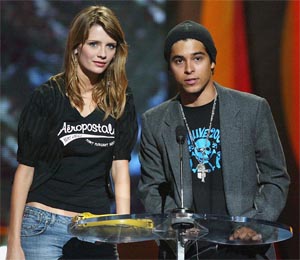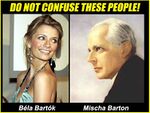Mischa Barton / Béla Bartók Controversy
The Béla Bartók / Mischa Barton controversy refers to the ongoing mistaken identity crisis involving the composer Béla Bartók and the flash-in-the-pan actress Mischa Barton.
Beginnings and Media Spotlight[edit]
This confusion originally stemmed from the corresponding incidence of assonance and alliteration present in the surname and given name of both individuals, in addition to their identical syllabic length and stress pattern.
Such phonetic similarities led Ashlee Simpson (who was reportedly dubbed) to infamously award the 'Best Breakout Female' Honor at the 2004 Teen Choice Awards to 'Mischa Bartók'. Although somewhat embarrassed, Simpson quickly attempted to win back the surprised audience by impulsively but erroneously exclaiming 'Béla Bartók' instead (and displaying a previously unsuspecting knowledge of Classical Music in the process). Fox were unable to censor Simpson's gaff or Jew-nose on the live broadcast, but made necessary cuts in time for subsequent re-runs.
Bartók's agent attempted to laugh-off the misunderstanding, but the composer is thought to have been deeply upset by it.[1] His critics hinted that the confusion appropriately symbolised Bartók's erudite attempts to differentiate Hungarian folk rhythms from the more popular body of Gypsy Music epitomised by Liszt's Bohemian Rhapsody. Meeting his idol Richard Strauss at the 1902 premier of That Fanfare from the Beginning of 2001, Bartók was devastated by Strauss' off-hand remark that 'nobody gives a bratwurst about that Hungarian folk shit, Béla'. When Bartók responded 'It's Magyar, not Hungarian', everybody in the country laughed at him.
Bartók was furious, and lunged at Strauss brandishing the unfinished draft of his overlong porn-Opera Blue Castle of Adventure (starring Brian Blessed). But before he could reach his target he was pinned down by Igor Stravinsky. Strauss proceeded to smack Bartók about for a while using a tone poem, sneering 'Welcome to the BP, bitch – this is how we do things down in Budapest.'
Progression of the Controversy[edit]
From these innocuous malapropisms and clumsy interextual references the Bartók/Barton confusion rapidly became gradually endemic, localised and confusing. As luck would have it, or not, an unfortunate incident occurred in Hungary in early 2005 during a televised interview with Mischa Barton.
Asked which of her works she considered the worst (a moot question) Barton confidently answered:
| “ | Definitely Ring of Endless Light. That was shit. I mean, all that stuff about telecommunication with Dolphins? And Ryan kept trying it on with me between takes. You know how I cry when my grandfather dies? That was because of what Ryan had done to me. I became a woman during that shoot. | ” |
Although this was probably the most remarkably candid interview Barton had (or has) ever given, there were evidently some problems with the Hungarian translation. Her response was subsequently transcribed:
| “ | Definitely my String Quartets. Like, that's it. I mean, all that 'innovation' thing? I tried to go along with it, but it was fake. You know the Allegro from No. 5? That recapitulation's not even me! My fame's a sham; everything's a fluke. | ” |
Bartók Goes Ape[edit]

Bartók genuinely believed Barton was mocking him, and expressed his objections on an ill-advised television announcement. It happened that in America this broadcast was sandwiched between a double-bill of The O.C. The publicity generated by his appeal backfired and drew more glaring attention to Barton and himself. Thereafter their identity confusion was seized upon by cultural commentators either side of the Atlantic.
In the chat-show world, for example, David Letterman and that-dodgy-bloke-who-plays-the-keyboard got into the spirit by alternately dressing-up as Barton and Bartók on every show. When Captain Obvious guested several weeks later, he remarked 'Have you noticed that Barton and Bartók have the same first five letters? Only the sixth letter is different.'[2] On another note, a 2006 Simpsons episode parodied The Strange Case of Dr. Jekyll and Mr. Hyde by having Barton and Bartók attempting to escape from Bart's body. This episode later received an Emmy nomination.[3]
Bartók was incandescent. Visiting the People's Republic of Rotherham for a performance of Puss-in-Boots at the Civic Theatre, he was about to throw it all away in a 12-hour binge (around the town's typhus-infested clubbing district) before being stopped short by his lover Zoltán Kodály, with whom he then journeyed off into the enigmatic East to 'research folk music'.
Effect on Barton[edit]
At the beginning of the controversy Barton had been able to see the funny side; at length, however, the constant comparisons to some Hungarian geezer, one-hundred-and-five years her senior and with a penchant for atonality, began to take its strain.
After Josh Schwartz suggested it would be a 'good laugh' to replace's Mischa's name with 'Béla Bartók' for the third season title-sequence of The O.C., and to do away with the California theme tune in favour of a speedy rendition of Bartók's 2nd Piano Concerto, Barton quit the show at the end of the second series. Schwartz chose to write-out her character Marissa Cooper (purportedly the long-lost sister of Clarrisa… Cooper from Clarissa Explains it All) via the breathtakingly original device of a fatal car crash. Although the episode that went to air simply ended by showing Marissa's body, Schwartz had devised a longer cut in which Bartók's Romanian Folk Dances could be heard playing from the car radio.
Recent Developments[edit]
As of early 2007 the European Human Rights Commission have been aware of the controversy, having undertaken a number of public information campaigns to highlight the stress caused to Béla Bartók and Mischa Barton, and to encourage positive and correct identification. The means and efficacy of these efforts have nonetheless received widespread criticism for a number of reasons.[4]
See Also[edit]
References[edit]
- ↑ "Bartok Thought to be Deeply Upset by O.C. Comparison", New York Times, September 2004
- ↑ This is a reference.
- ↑ Shortlist for 'Most Convoluted Synthesis of Literature and Pop Culture', 2006 Emmy Rossum Awards
- ↑ "Brown's New Tax War on Middle Britain", The Daily Express, 16 June 2007

